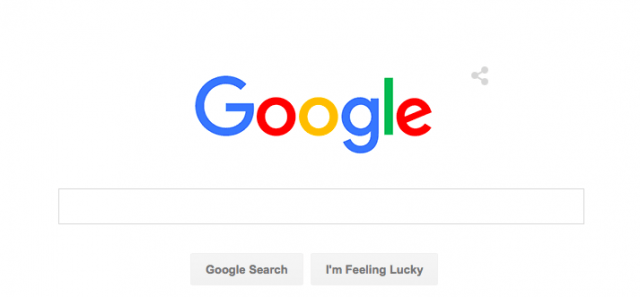
Source: Google.com
It isn’t true that you can search for anything you want, delete your browsing history, and no one will know what you were reading. Google records what you search and uses that information to figure out how to target ads specifically to you. So it’s not just Google that knows exactly what you’re searching. As Google explains in its Privacy & Terms FAQs, “When you click on a search result in Google Search, your web browser also may send the Internet address, or URL, of the search results page to the destination webpage as the HTTP Referrer. The URL of the search results page may sometimes contain the search query you entered.” You might not think that the URL of a page contains a whole lot of useful information — until you consider an example like the WebMD page for an STD or the website for your hometown.
Even just for the ads displayed on Google Search, Google uses information on what you searched for, your location, and the time of day to choose ads. It also takes into account your previous web searches, your Google Web History, your history of visiting websites that advertise with Google, information from your Google account like your age and gender, and your previous interactions with Google’s ads and search results. With all that in mind, read on for five things that you shouldn’t ever search for when using Google.
1. Don’t search for things that clue Google in to your location

Source: Thinkstock
About a year ago, New York Times columnist David Leonhard told NPR about how search terms differ geographically, with major differences between counties where life is easiest and counties where life is hardest. A high prevalence of searches on health problems like blood sugar and diabetes, searches on “what might be called the dark side of religion,” searches about selling Avon or getting Social Security checks, and searches about “specific kinds of guns” occurs in areas where people are more likely to struggle with money or suffer health problems. Your searches give your search engine a view of how economic trends manifest themselves in your everyday life — something you may not want advertisers capitalizing upon.
2. Don’t search for information on medical issues or drugs

Source: Thinkstock
Tim Libert, a doctoral student at the University of Pennsylvania’s Annenberg School for Communication found that more than 90% of the 80,000 health-related pages he looked at exposed user information to third parties. The pages he researched included commercial, nonprofit, educational, and government websites, and the finding is particularly unsettling given a Pew Research Center finding that 72% of Internet users in the United States look up health-related information online. Even worse? Google collects information from 78% of the pages that Libert looked at, which gives advertisers an easy way to figure out that a user has specific health issues, and find out what issues those are. Visits to pages on HIV/AIDS, for instance, can be combined with a user’s browsing history and lead to ads for HIV and AIDS treatments, which Ungerleider notes effectively outs their HIV status.
A bigger privacy issue, Libert worries, are leaks that could expose people’s intimate health information to anyone willing to buy a hacked database. Stolen medical information is routinely trafficked on criminal websites, and are often used for Medicaid fraud and other scams. Third parties could match you with your medical search results, and advertisers could even discriminate against you based on your medical searches, even if they’re never connected to you definitively.
3. Don’t give your search engine hints about your insecurities

Source: Thinkstock
Amanda Hess recently reported for Slate that a category of searches she’s dubbed “Google, am I normal?” is a “scintillating resource for advertisers.” Hess explains, “I’ve been tipping Google off to all the real ailments and imagined insecurities that I already have, at a pace of about once an hour, every hour of the day: celebrity diet, pants are uncomfortable, migraine difficulty speaking, before and after plastic surgery, and worst cramps ever why.” Each of those gives an easy in to advertisers, who don’t even have to show you an ad first to get you to think about your insecurities, and how their products might help.
It may not seem like a big deal compared to having ads about treatments for an illness you may or may not have following you around the Internet. But if you don’t want to see ads that are specifically tailored to things that you already don’t like about your body, even if, objectively, they aren’t a huge deal, you should avoid sharing those insecurities with your search engine in the first place.
4. Don’t search for anything suspicious (especially at work)

Source: iStock
The lesson learned? Don’t search for suspicious terms, or anything that could be construed as crime-related, when someone is watching your browsing history. (The safest course of action is to assume that someone always is.) On a similar note, it’s a bad idea to search anything crime-related if you have something to hide. Obviously we don’t condone committing a crime. But it’s worth noting that people’s Google searches have been used to convict them of crimes, especially when they just so happen to Google the crime right before or after they’ve committed it. See this Palo Alto case as an example, or read Lee Rowland’s report on how a New York case highlights the problem with finding someone guilty of a conspiracy or an attempt to commit a crime when the only evidence is words shared online. “It’s one thing to use a Google search as evidence of intent or knowledge, when an actual crime has resulted and there’s a real victim.”
5. Don’t Google anything that enables Google to define your identity

Source: Thinkstock
Paul Ohm, a law professor at the University of Colorado at Boulder, told the Times that companies can combine hundreds or thousands of facts about you into what he terms “a database of ruin.” With discrete and unconnected facts about you, an algorithm could sort through profiles of hundreds of thousands of users like you and accurately predict something unrelated about you or your activity. Ohm argues that there’s at least one closely-guaraded secret that could lead to harm if revealed, like “a medical condition, family history or personal preference,” and the database of ruin makes that secret hard to conceal.
Even if many classifications are inaccurate, they can still harm you with effects like price discrimination, in which companies profile you and determine how much to charge you for goods or services. Rosen reports, “the new world of price discrimination is one where it’s hard to escape your consumer profile, and you won’t even know if companies are offering discounts to higher-status customers in the first place.” He imagines that “As personalization becomes ubiquitous, the segmented profiles that advertisers, publishers and even presidential candidates use to define us may become more pervasive and significant than the identities we use to define ourselves.”
If you’re looking to minimize the amount of information that search engines and advertisers collect on you, there are a few steps you should take. Choose an alternative search engine, like DuckDuckGo, to keep your search history from being recorded and analyzed. Install an extension like AdBlock Plus, Ghostery, or Disconnect to protect yourself against companies who want to track your activity online. Check your privacy settings on popular sites, and always log out of social networks when you’re browsing the web.





0 comments:
Post a Comment
What's On Your Mind?